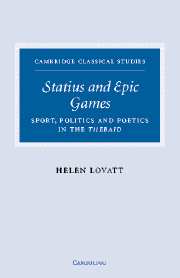5 - The wrestling
Published online by Cambridge University Press: 27 October 2009
Summary
Introduction
We have seen how ancient poets use chariot racing and other sports to represent poetic competition. In modern critical literature, too, competition can be figured as a sporting contest. On the first page of Harold Bloom's seminal discussion of poetic competition, Anxiety of Influence, he uses the metaphor of wrestling: ‘My concern is only with strong poets, major figures with the persistence to wrestle with their strong precursors, even to the death.’ In this chapter, we will look closely at Statius' wrestling match and unpick its representations of intertextual competition. For the match offers itself as a textual and intertextual metaphor: the bodies of the competitors can be read as the bodies of poetic texts; the theme of paternal inheritance is a poetic anxiety as much as a heroic one; but, above all, the clear allusions to wrestling matches in Ovid and Lucan, and through them back to a tradition which includes Virgil, Apollonius and Homer, create an ever more complex process of reading the match, in which Statius is truly wrestling with tradition.
The challenge is to decide how to understand the significance of this metaphor. A wrestling match is an aggressive competition between two contestants; it is dichotomy in action. Critics are drawn to dichotomies as ways of articulating literary history. We can read Latin epic of the first century ad through many different dichotomies: Ovid versus Virgil; love versus war; innovation versus tradition; Callimachean versus epic.
- Type
- Chapter
- Information
- Statius and Epic GamesSport, Politics and Poetics in the Thebaid, pp. 193 - 242Publisher: Cambridge University PressPrint publication year: 2005
- 1
- Cited by

